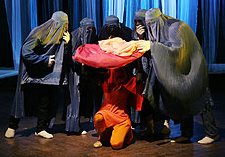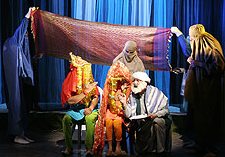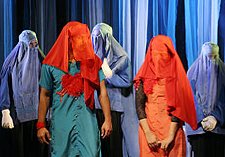Guest Post by Omer Alvie
[This satirical account is inspired by the real-life drama about the Ajoka play Burqavaganza in the Pakistan capital; See The News Editorial; Gulf News op-ed; a Daily Times report on the original play, and other press coverage.]
So this is how it all happened. Ajoka, a non-commercial theatre group committed to the cause of social change in Pakistan, unveiled its new play Burqavaganza last month in Lahore. The satirical play, written by Shahid Nadeem, addresses the issue of the burqa (veil) and highlights the double-standards and hypocrisy of the feudal/tribal mindset. The aim was to use humour and satire to challenge the cultural status quo and to provoke people to think for themselves.
The audience thoroughly enjoyed the show and the play received positive reviews in the press. But the most surprising response to the play came from a rather astute group of individuals belonging to the MMA (more popularly known as Mullah Military Alliance). Inspired by the success of the Burqavaganza, five extremely talented MNAs decided to perform their own impromptu over-the-top ‘dramaâ⠂¬Ëœ in the National Assembly. The play imaginatively titled Fanativaganza (by yours truly), was a staged rebuttal to the Ajoka group’s play.
Substituting the use of satire, the inspired MNAs opted for provocative language and violent hand gestures to ridicule the writer of Burqvaganza and the Director of the Ajoka theatre group. Apparently, to these five highly sensitive and pious individuals, the Burqavaganza play was clearly un-Islamic, enough to be classified as blasphemous. Although, it has to be clarified that these days, any critique, criticism, aspersion, censure, swipe or nitpicking of the norms and practices of these religious extremists will likely lead to a blasphemy charge, even if it is a comment regarding the general unruliness of their beards.
One minor clarification here, they cannot be called religious fundamentalists. This is because they fail to grasp the fundamentals of the religion they claim to be following. ‘Nuttersâà ¢â€šÂ¬Ã¢â€žÂ¢ is more appropriate and generally my preference.
The MNA performed drama did not get a positive response from the public or the press, but it did manage to get a standing ovation from the Minister of Culture, who subsequently announced a government ban on the Burqavaganza play to show his appreciation for the drama queens of the national assembly. He was so moved by the MMA performance that he additionally promised further government actions against the key members of the Ajoka Theatre group. I have to admit, as a Pakistani citizen, hearing this news brought a lump to my throat. It wasn’t that I was emotional, it just happened to be part of the process of me regurgitating my last meal, as I got sick to my stomach.
It is clear now that the government’s attempt at promoting ‘enlightened moderation’ in reference to religion has not been very successful. Actually, that is an understatement; it has been an unquestionable, resounding failure. I do admit though that they have managed to create an era of (religious) ‘moderated enlightenment� �. When your faith is judged by the size of your beard or measured by the length of your veil, you are in serious, serious trouble!
Omer Alvie is a Pakistani residing in the UAE and writes, often satirically, on his blog The Olive Ream. He also writes about the Pakistani blog scene at Global Voices. This post was first published at The Olive Ream.























































[quote post=”712″] how come the ehraam worn during Haj by women does not cover the face [/quote]
Ehram is required during Umrah and Hajj(5 days onlu), during ehram,one can’t even use Khusboo wala soap. Now one would like to ask why soap is not allowed? During Tawaf, it’s asked not to see towards ka’aba but when you are not circling, you can see towards as much as you want. In Ahram, you can’t touch the cover of Ka’aba because officials spray Arq-e-Gulab on it but when you are not in Ahram, you can touch ,grab the cover as long as you want.
Do remember that restrictions are only when you’re wearing Ehraam,once you have performed umrah or hajj, ladies can wear Niqab on their faces. Also Ahmran doesn’t mean that official dress, ahram starts after reading particular dua and ends after performing Halq and qasr(Trimming or cutting off hair). once halq or qasr is done, one is free to remain in same dress or wear jeans ,shalwar whatever he wants.
Now why there are restrictions, there are many things which we are asked to obey or have to obey and there is no excuse for not obeying it just because our wisdom can’t comprehend it. For instance existance of Allah. People fall in love with others but usually they don’t find any scientific and logical reason why did they fall in love. I particularly don’t remember that there is any reference why God ordered particular restrictions durin Hajj or Umrah. Maybe someone else can shed light on us. The point is, Allah is our master and we’re slaves,slaves have to do things which are asked by masters without arguing why did He order and what logic did he use. Rest, Allah knows the best.
[quote post=”712″]Many scholars do not consider covering the face as essential in islam.[/quote]
Yes, If I remember right then Niqab[face covering] is not part of “Satar” but Quran advised to wear it to prevent any fitnah. This is why Surah Nur and Surah AHzab[I think] specially talked about this issue.
Many scholars do not consider covering the face as essential in islam.
Burqa is more of a cultural than religious thing. Many women in south asia have historically tended to cover their faces irrespective of their religious beliefs. This phenomenon can be observed even today in many parts of india where hindu women cover their faces when going out (ghoongat).
In arab countries, many women wear abaya which is a modification of burqa but without face covering.
I have had a question in my mind for a very long time.
If the burqa that covers the entire body and the face is an islamic dress then how come the ehraam worn during Haj by women does not cover the face ?
All those ladies that cover thier face in thier daily life , do they uncover it during haj ?
Also if it was an islamic junction to cover the face then should that not have been a part of the ehram too ?
Will someone please enlighten …
This seems to be a tragic result of the eight dark musharraf years. Today both religious and secular extremists have gained prominence while the moderates who form an overwhelming majority are being forced to choose sides in the fight of extremists.
[quote comment=”49976″]Pervaiz Munir Alvi bhai … you’ve made a valid point although it’s the other way around. The non-religous secularists are imposing their ideals on the religous with such antics.[/quote]
Wow..how many “religious” have “non-religious” killed so far? At the same time how many fellow Muslims have been killed by the “religious”? Care to count? Too many.
MQM like parties were formed by Zial ul Haq, the “ameer-ul-momineenâ€